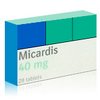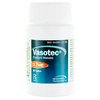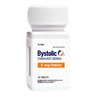 | Aceon (Dorover) Active Ingredient: Perindopril Erbumine Aceon is used for treating high blood pressure. Other names for this medication: Acertil, Acerycal, Agulan, Aldoc, Apo-perindox, Armix, Asyntilsan, Bionoliprel, Biprel, Bipreterax, Cardipen, Co-prenessa, Co-prestarium, Cobathrow, Coveram, Coverene, Coverex, Coverex-as, Coversum, Covinace, Domanion, Dorover, Indapril, Inopil, Midopril, Noliprel, Pendoril, Pendrex, Percarnil, Perindal, Perindan, Perindo, Perindox, Prenessa, Prenix n, Prestance, Prestarium, Preterax, Prexanil, Prexanil a, Prexum, Prindace, Procaptan, Provinace, Reaptan, Repres plus, Spopress, Stopress, Teraxans, Tertensif kombi, Vectoryl, Vidotin Show all |
Aceon 8mg
Aceon 4mg
Aceon 2mg
INDICATIONS
Aceon is used for treating high blood pressure. Aceon is an angiotensin-converting enzyme (ACE) inhibitor. It works by blocking ACE, an enzyme involved in narrowing blood vessels and causing sodium and fluid retention by the kidneys. This causes blood vessels to relax, allowing blood to flow more freely and at a lower pressure, and increasing the heart's ability to pump blood in some types of heart failure.
INSTRUCTIONS
Use Aceon as directed by your doctor.
- You may take Aceon with or without food.
- Take Aceon regularly to receive the most benefit from it. Taking Aceon at the same time each day will help you to remember to take it. Continue taking Aceon even if you feel well.
- If you miss a dose of Aceon, take it as soon as possible. If it is almost time for your next dose, skip the missed dose and go back to your regular dosing schedule. Do not take 2 doses at once.
Ask your health care provider any questions you may have about how to use Aceon.
MORE INFO:
Active Ingredient: Perindopril erbumine.
STORAGE
Store Aceon at room temperature, between 68 and 77 degrees F (20 and 25 degrees C). Store away from heat, light, and moisture. Keep Aceon out of the reach of children and away from pets.
Do NOT use Aceon if:
- you are allergic to any ingredient in Aceon
- you are in the second or third trimester of pregnancy
- you have a history of giant hives or skin inflammation caused by ACE inhibitors
- you are taking or have taken dextran sulfate within the past 3 days.
Contact your doctor or health care provider right away if any of these apply to you.
Some medical conditions may interact with Aceon. Tell your doctor or pharmacist if you have any medical conditions, especially if any of the following apply to you:
- if you are pregnant, planning to become pregnant, or are breast-feeding
- if you are taking any prescription or nonprescription medicine, herbal preparation, or dietary supplement
- if you have allergies to medicines, foods, or other substances
- if you have a history of giant hives or skin inflammation, or hardening of the skin or organs
- if you have bone marrow depression, blood vessel problems in the brain (including stroke), or severe immune system disease
- if you are undergoing dialysis
- if you have high blood potassium, low blood sodium, or are on a sodium-restricted diet
- if you have ischemic heart disease, liver or kidney problems (including transplant), or lupus, or you are dehydrated.
Some medicines may interact with Aceon. Tell your health care provider if you are taking any other medicines, especially any of the following:
- Indomethacin, nonsteroidal anti-inflammatory drugs (NSAIDs) (eg, ibuprofen), or salicylates (eg, aspirin) because the effectiveness of Aceon may be decreased
- Clozapine, cyclosporine, dextran sulfate, HMG-CoA reductase inhibitors (eg, simvastatin), indomethacin, mannitol, NSAIDs (eg, ibuprofen), pergolide, phenothiazines (eg, chlorpromazine), potassium, potassium-sparing diuretics (eg, triamterene), thiazide-type diuretics (eg, hydrochlorothiazide), or trimethoprim because the actions and side effects of Aceon and these medicines may be increased.
- Iron, lithium, sulfonylureas (eg, glyburide), or thiopurines (eg, azathioprine) because the actions and side effects of these medicines may be increased.
This may not be a complete list of all interactions that may occur. Ask your health care provider if Aceon may interact with other medicines that you take. Check with your health care provider before you start, stop, or change the dose of any medicine.
Important safety information:
- Aceon may cause dizziness or lightheadedness. Do not drive, operate machinery, or do anything else that could be dangerous until you know how you react to Aceon. Using Aceon alone, with other medicines, or with alcohol may lessen your ability to drive or perform other potentially dangerous tasks.
- Dizziness or lightheadedness may occur if you stand up too fast from a lying or sitting position. Avoid sudden changes in posture.
- Drink plenty of fluids while taking Aceon and avoid engaging in activities that cause excessive sweating. Dehydration, excessive sweating, vomiting, or diarrhea may lead to a fall in blood pressure. Contact your health care provider at once if any of these occur.
- A persistent, unproductive cough may occur. Tell your doctor if this occurs. Recovery is rapid when the medicine is stopped.
- Patients being treated for high blood pressure often feel tired or run down for a few weeks after beginning therapy. Continue taking our medicine even though you may not feel quite "normal." Contact your doctor or pharmacist about any new symptoms.
- Black patients are at higher risk for certain side effects, and may not respond as well to Aceon as patients of other races.
- Before you have any medical or dental treatments, emergency care, or surgery, tell your doctor or dentist that you are taking Aceon.
- Aceon may lower your resistance to infection. Prevent infection by avoiding contact with people with colds or other infections. Do not touch you eyes or the inside of your nose unless you have thoroughly washed your hands first.
- Do not use salt substitutes containing potassium without first talking with your health care provider.
- It may take several weeks for Aceon to work. Do not stop taking Aceon without checking with your health care provider.
- Lab tests, including liver function, kidney function, blood pressure, blood counts, and blood electrolytes, may be performed to monitor your progress or to check for side effects. Be sure to keep all doctor and lab appointments.
- Caution is advised when using Aceon in the elderly because they may be more sensitive to its effects, especially dizziness and rash.
- Children should use Aceon with extreme caution. Safety and effectiveness have not been confirmed.
- Pregnancy and breast-feeding: Aceon has been shown to cause harm to the fetus. If you become pregnant, discuss with your doctor the benefits and risks of using Aceon during pregnancy. It is unknown if Aceon is excreted in breast milk. Do not breast-feed while taking Aceon.
All medicines may cause side effects, but many people have no, or minor, side effects.
Check with your doctor if any of these most common side effects persist or become bothersome:
Abnormal skin sensation; arm or leg pain; back pain; cough; depression; diarrhea; dizziness; drowsiness; headache; lightheadedness; nausea; runny nose; weakness.
Seek medical attention right away if any of these severe side effects occur:
Severe allergic reactions (rash; hives; difficulty breathing; tightness in the chest; swelling of the mouth, face, lips, or tongue); change in the amount of urine; chest pain; darkening of urine; difficulty swallowing; fainting; fast or irregular heartbeat; fever; hoarseness; pounding in the chest; prolonged nausea, vomiting, or diarrhea; severe lightheadedness or fainting; sore throat; swelling of the hands, legs, face, lips, eyes, throat, tongue, or trunk; unusual joint pain; unusual muscle pain, cramps, or weakness; unusual stomach pain; yellowing of the skin or eyes.
This is not a complete list of all side effects that may occur. If you have questions about side effects, contact your health care provider.
Customers who bought this product also bought:
 Tenormin$0.35 for pillTenormin is used to treat angina (chest pain) and hypertension (high blood pressure). It is also used to treat or prevent heart attack. More info
Tenormin$0.35 for pillTenormin is used to treat angina (chest pain) and hypertension (high blood pressure). It is also used to treat or prevent heart attack. More info Micardis$1.12 for pillMicardis is used for treating high blood pressure alone or with other medicines. More info
Micardis$1.12 for pillMicardis is used for treating high blood pressure alone or with other medicines. More info Vasotec$0.56 for pillVasotec is used for treating high blood pressure, heart failure, and other heart problems. More info
Vasotec$0.56 for pillVasotec is used for treating high blood pressure, heart failure, and other heart problems. More info Midamor$0.44 for pillMidamor is used for preventing development of low blood potassium or helping to restore normal blood potassium in patients with high blood pressure or heart failure. More info
Midamor$0.44 for pillMidamor is used for preventing development of low blood potassium or helping to restore normal blood potassium in patients with high blood pressure or heart failure. More info
